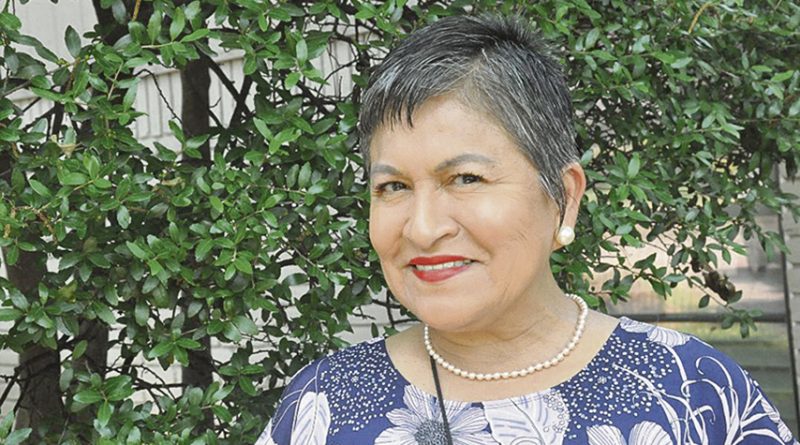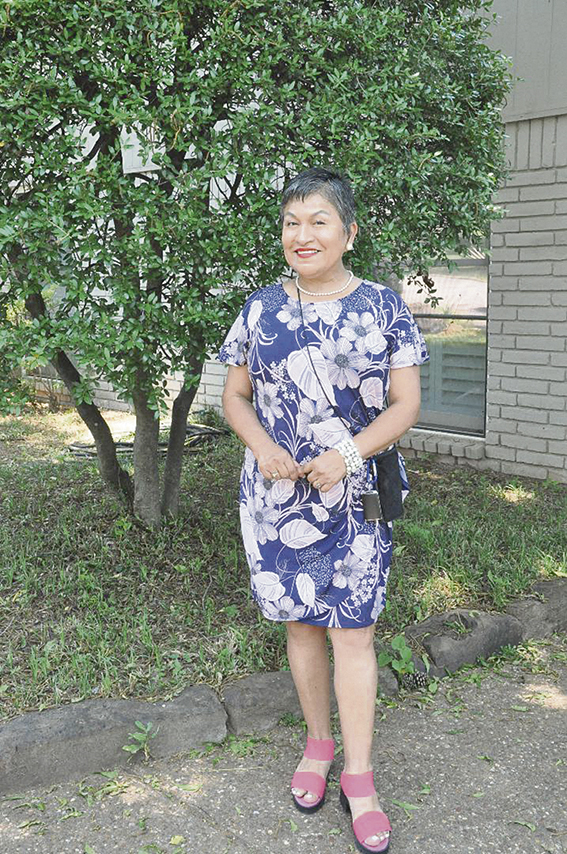Tina Peña, una vida ayudando a los demás / Tina Peña, a life helping the Hispanic community
Por Guillermo Rojas y Victoria Lis Marino | Tulsa, OK
José Martí dijo alguna vez que ayudar al que lo necesita no sólo es parte del deber, sino de la felicidad, y posiblemente este sea el secreto de la sonrisa de Tina Peña, una de las representantes más fieles de la verdadera solidaridad latinoamericana en Tulsa.
Tina es famosa en varios círculos, están los que la conocen por su programa de televisión “Temas en Tulsa” y su compromiso con la información y el debate. Luego, quienes fueron sus alumnos en el Tulsa Community College, donde dirige el Departamento de Español y quienes han participado en alguna campaña de MITA’s, la fundación que preside con tanto cariño en auxilio de los niños del Perú. En todas sus funciones, Peña se compromete con los hispanos locales buscando empoderar a quienes más lo necesitan y ayudar en la búsqueda de oportunidades. A sus sesenta años Peña confiesa: “Siento como un llamado que necesito continuar ayudando a mi gente”.
Hace 41 años llegó a Tulsa con una misión, encontrar empleo para poder ayudar a sus padres en Perú. “Eran tiempos de hiperinflación y ellos habían perdido casi todo. Por eso consegui 3 trabajos para asistirles”, recordó Peña. Y así fue como así la palabra ayudar se caló hasta sus huesos. No sólo obtuvo esos empleos sino que concluyó la universidad con mucho sacrificio, se graduó en educación ,y logró traer a sus padres a los Estados Unidos.
Esa capacidad de brindarse y asistir sin reparos es la que la llevó lejos en TCC, donde no sólo es una de las docentes más reconocidas sino que se transformó en una verdadera guía para los estudiantes hispanos. “He tratado con mucho gusto de darles mi ayuda porque no siempre las personas se toman el tiempo para guiarlos, por eso soy coordinadora del departamento de español, porque quiero que sean completamente bilingues. Muchos padres vienen a este país obsesionados con que los chicos hablen inglés, y se olvidan de que también deben aprender a hablar bien el español y escribirlo. El bilinguismo mejora las oportunidades laborales y salariales”, explicó Peña.
Hoy, se especializa en la enseñanza de interpretación médica, comunitaria y traducción, y busca que sus estudiantes se acrediten como intérpretes para cumplir con las futuras normativas estatales. “Necesito que rindan sus exámenes para seguir creciendo en la comunidad”, admite.
No obstante, sabe que muchas veces, es difícil para las familias latinas recién llegadas sostener la educación superior y por eso considera clave estar siempre en contacto con los padres de los alumnos para empujarlos hacia la excelencia. “Tuve alumnos que venían y me contaban que sus familias querían que dejaran la escuela y se pusieran a trabajar por diversas situaciones, hermanos que nacían, padres en la cárcel, deportaciones. Y yo tenía que ir a sus casas e interceder, para demostrarles a esos padres con estadísticas en mano que si sus hijos cuentan con una profesión ganarían mucho más, y podrían ayudarlos en su futuro de una mejor manera”, dijo Peña, asegurando que todos sus ex alumnos gozan de oportunidades que no hubiesen tenido de abandonar la universidad. “La mayoria de los graduados de TCC están liderando y ayudando a otros, y ese es regalo más grande que uno puede recibir, continuar con la cadena de ayuda”, dijo Peña.
Su carrera en educación también le permitió cambiar la vida de muchas mujeres latinas que en suelo americano consiguieron credenciales para tomar nuevas decisiones. “Ahora, las mujeres están empoderadas, pueden educarse, trabajar, resolver cosas de la casa y traer el pan del día. Si no se educan no pueden empoderarse y las necesitamos fuertes para que puedan tenee la posibilidad de decir que no”, explicó.
Tina dice que se siente plena por haber dejado su granito de arena en Tulsa, hay quien dice que dejó una playa entera, pero lo importante es que en su vocación solidaria nunca se olvidó de sus orígenes y mediante a la fundación MITA’s trabaja para asistir a los niños carenciados del Perú. “Cuando mi mamá murió nos enteramos de que cada vez que iba a Perú llevaba juguetes para los niños de una comunidad, y con mi familia, en su nombre decidimos continuar con su obra y crear una fundación que institucionalizara esa ayuda”, explicó Peña. Hoy, su fundación apadrina una escuela, un parque y un hospital en el Perú que la vio nacer, demostrando que la solidaridad no tiene fronteras.
“El problema que tenemos con MITA’s es que muchas personas en Estados Unidos no quieren ayudarnos porque sienten que el dinero que recaudamos se va a los niños de otro país. Pero yo digo, ¡niños son niños, aquí y en el Perú!”, aseguró. Y para demostrar que no sólo cosecha para el Perú Tina Peña y su fundación se asociaron a distintas organizaciones en Tulsa como Reading Partners y el banco de alimentos, para fomentar el intercambio solidario y demostrar que la meta es siempre la misma: ayudar.
Con un pie en el retiro, Tina Peña reconoce que su misión aún no ha concluído y a todos los estudiantes les recuerda: “ Oklahoma es un estado donde todavía se puede ir a la universidad siendo indocumentado, hay becas por todos lados. Quiero que los hispanos continúen educándose, es la principal herramienta para que nos representen y puedan ayudar a sus familias”.
Tina Peña, a life helping the Hispanic community
By Guillermo Rojas and Victoria Lis Marino | Tulsa, OK
José Martí once said helping those in need is not just part of our duties but also of our happiness, and maybe that’s the real secret behind Tina Peña’s smile, one of the most faithful representatives of Latin American solidarity in Tulsa.
Tina is famous in different circles. Some might know her for her TV show “Temas en Tulsa” and her commitment to the industry of information and knowledge. Others may have been students of hers at Tulsa Community College where she runs the Spanish Department, and all the rest definitely are acquainted with MITA’s, the foundation she chairs in the aid of Peruvian children. In all her roles Peña is committed to the growth of the Hispanic community and the empowerment through real opportunities of those who need it the most. Today, at 60, she confesses: “I feel a true calling for helping my people.”
41 years ago, she came to Tulsa with a mission, to find a job to support her parents in Peru.
“Those were difficult times, hyperinflation in my country made my family lose everything, and I had to take three jobs to assist them,” she recalled. And that is how the word “help” worked itself into her bones.
Not only did she got those jobs, but also went to college and obtained a degree in education, which eventually allowed her to bring her parents to America.
Her endless capacity of providing for others and assisting unabashedly distinguished her as a scholar at TCC, where she became not only a successful teacher, but also a mentor to Hispanic students.
“I have tried endlessly to give them help, because not all people take the time to guide them,” she explained. “That is why I decided to coordinate the Spanish department, because I want them to be fully bilingual. Lots of parents that come to the US are desperate for their kids to learn English and forget that they should also continue learning Spanish, which means speaking and writing. Bilingualism improves work offers and wages.”
Today, Peña specializes in the field of medical interpretation, community interpretation and translation services and wants her students to become certified translators to be able to abide to the future state regulations.
“I want them to sit for the tests to make this community grow,” she urged.
Still, she knows that sometimes it’s hard for the new families in town to keep their children in school, which is why the key to excellence is having a constant rapport with parents and informing them about the importance of attaining a degree.
“I had students that told me their parents wanted them to quit so that they could work more to support the family for different reasons, the birth of a sibling, the deportation of a parent and even jail. I had to go to their houses and intercede, proving to the parents with real data how a degree would provide better jobs and eventually bring more money into the household,” said Peña, noting that her students wouldn’t be where they are without education. “Most of my TCC students are today in leading positions, helping others. And that’s the best gift one can get, to continue with the chain of help.”
Her career in education also allowed her to change the lives of many Latinx women, who found on American soil the path to make new decisions.
“Now our women are empowered, they can get an education, they can work, be the souls of their homes and put the bread in the table,” she explained. “If they don’t receive an education, they lose the capacity of empowerment and we need them standing tall so that they can learn to say no.”
Peña says she feels complete for leaving a grain of sand in Tulsa, although some may say she has already left a whole beach. Still, in her mission she has never forgotten her origins and through MITA’s she works to assist the underprivileged children of Peru.
“When my mother died, we found out that every year she brought gifts to the children of a community,” Peña recalled. “And we decided to continue with her work and create a foundation that institutionalized her aid.”
Today her foundation sponsors a school, a hospital and a park in Peru, proving that solidarity has no borders.
“The problem we have in MITA’s is that many in the US refuse to collaborate because they say the money goes abroad, but children are children – here and in Peru,” said Peña.
Today MITA’s is participating in different projects around Tulsa in association with local organizations such as reading partners and the food bank to foster cooperation and exchange while demonstrating that helping is the true goal.
While looking forward to retirement, Peña recognizes she is nowhere ready to conclude her mission and gives students the following advice:
“Oklahoma is a state where you can go to college being undocumented, and there are scholarships everywhere. I want Hispanics to get an education. It is indeed the main tool to achieve representation and keep on helping their families.” (La Semana)



 (1) (2).jpg)


Debe estar conectado para enviar un comentario.